Is postpartum hair loss common?
What is the reason for increased hair fall after delivery?
How long will this hair loss continue?How to limit postpartum hair loss?
If you are in search of an answer to any of the questions above, then definitely you are a new mom and right now you are experiencing enormous hair fall.
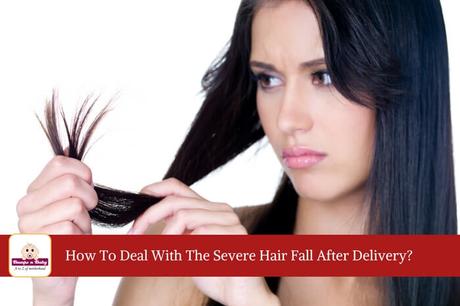
During pregnancy period, you had that lustrous shiny hair and even felt a glow of pride when your friends or relatives admire those beautiful tresses. Isn't it?
But after delivery, there goes your good hair days and now are you stressed with your hair fall. Let us see in detail why this happens.
Before heading into the hair loss problems, firstly have a look at hair growth cycle to get a clear picture of the hair fall after pregnancy.
A little on structure and growth cycle of hair
Human hair structure is very complex but we are in no mood to do a detailed class on that. Let us look only into what is important for us to understand hair fall post pregnancy.
Each hair can be divided into two parts - root and shaft. The hair root is anchored to the scalp skin while hair shaft is the hair that is visible outside the scalp.
The base of the hair root appears as a bulb shape and has hair follicles. The hair bulbs are well fed by blood capillaries and nerve fibers. The cells inside the hair bulb divide and form new cells. These newly formed cells force out the old cells upward to form a tough hair shaft. This is how hair grows.
Hair growth usually undergoes two phases - growing and resting phase.
Growing phase is when the bulb shaped hair root is well attached to the blood capillaries and nerves and forms new hair cells continuously by cell division. This means a hair in growing phase is getting longer. The growing phase can last to about 2 to 6 years. The longer the growing phase longer your hair will be.
Resting phase is when the bulb detaches itself from the blood capillaries and nerves and is no longer able to produce new hair cells. Note that the hair bulb detaches from the blood capillaries but is still attached to the scalp during its resting phase. The resting phase is only about 2 to 3 months after which the hair falls out.
At any time when we take a normal woman's head, more or less 15 % of hair would be in the resting stage. Majority of the hair, say about 85 to 90% of the hair would be in their growing phase.
Why is there an increase in hair fall after delivery?
For a healthy woman, the hair loss would be around 70-100 hairs per day. But post-delivery, hair shedding rises to 500 hairs per day.
People often think that postnatal hair loss is due to the medications one take during pregnancy. Some even relate it with breastfeeding. Both are myths.
The fact is that the hair fall post delivery is purely hormonal.During pregnancy, increased levels of estrogen hormone affect the hair growth cycle. The growing phase becomes longer and very little hairs than normal enter the resting phase. This brings minimal hair fall and makes your hair very voluminous as there is more growing hair and very little resting hair that are about to shed.
After delivery when the estrogen level decreases more hairs than normal enters the resting phase. Once the hair enters resting phase it will fall out after 2-3 months. Since it is more than normal hair fall, many feel it as extreme hair loss after pregnancy.
Should I be worried about postpartum hair loss?
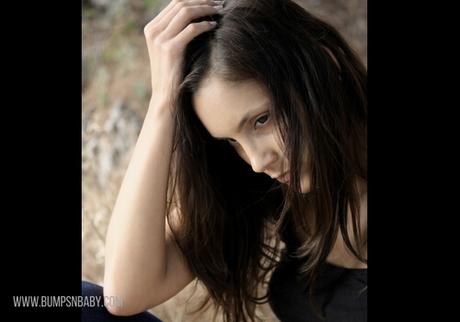
Needless to say, this hair fall is quite normal and you are not going to be bald-pated. So, don't stress out too much about your tresses.
This post-partum hair loss does not last more than a year and you can get back your normal hair volume.
9 Home remedies to control hair loss post pregnancy
As I told earlier, hair loss after delivery is completely natural and hormonal. The tresses start growing back around your baby's first birthday. Never stress too much thinking of your hair fall. Stress can lead to more hair loss, which is again another story which we are not discussing now.
It is true that we can't do anything to completely stop postpartum hair fall. However, we have the option to make hair strands stronger by gearing up with simple home remedies.
These home remedies certainly help you to bring back your normal hair texture.
#1. Amla or Indian GooseberryAmla or Indian gooseberry, which is rich in vitamin C, is one of the traditional remedies used for solving almost all the hair related problems. Try to include amla in your daily diet.
How to apply on hair- Take 1 cup of coconut oil in an iron wok
- Put some freshly chopped amla or dried form into this oil
- Boil till the gooseberries become black in color
- Make it cool, allow the oil to stay in the same iron vessel overnight
- The next day, transfer it to a container
- Daily or alternate days massage your scalp with this oil
- After few hours take head bath with a mild shampoo
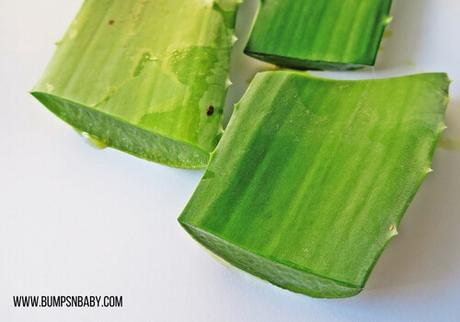
Aloe vera, which is rich in proteolytic enzymes, are very beneficial for damaged hair, hair regrowth and to control hair shedding. It also contains a good amount of proteins, vitamins, and minerals. Moreover, the moisture content present in this acts as an excellent conditioner for the hair.
How to apply on hair #3. Bhringaraj (Karisilakanni in Tamil)Bhringaraj, commonly known as false daisy is an Ayurvedic herb that is widely used in the preparation of hair oils since the olden times. This herb is very rich in vitamins and minerals that are essential for healthy hair strands.
How to apply on hair- Take a few fresh or dry Bhringaraj leaves
- Make a paste out of it and apply it on your scalp
- Leave it for 30 minutes and wash your hair
- If using dried leaves, it's better to soak the leaves in warm water for 15 min then grind it to paste.
- You can also boil these leaves in coconut oil and use that infused oil to apply on your scalp
Curd is a super easy home remedy for controlling postpartum hair loss and to speed up hair growth. It's loaded with proteins, vitamin D, and vitamin B5, which will strengthen your hair from inside. You can also consume yogur daily for the hair growth.
How to apply on hair- Apply curd on your hair
- Leave it for about 20 minutes
- Wash hair thoroughly with water
- Do this at least weekly once
Curry leaves are rich in many nutrients such as calcium, iron, phosphorous, proteins and vitamin C. Curry leaves are effectively used to prevent hair fall, premature greying and hair growth.
How to apply on hair #6. Egg whiteProteins are an essential nutrient for a stronger hair. Egg white is very rich in proteins. So, applying egg on your scalp supplies the required amount of proteins to the hair.
How to apply on hair #7. Fenugreek seeds or methi seeds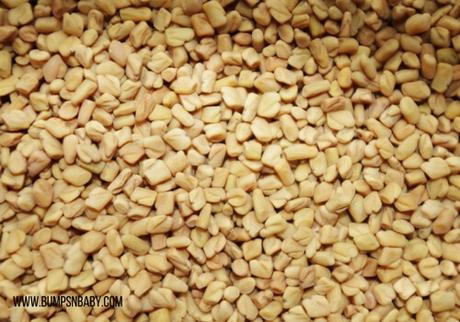
This miracle herb can do wonders for your hair. Fenugreek seeds are very rich in proteins, iron, vitamin C, nicotinic acid, potassium and lecithin which all are essential for good hair growth. You can also consume fenugreek seeds as it will promote lactation too. Better lactation and less hair fall postpartum- it's a win win!!
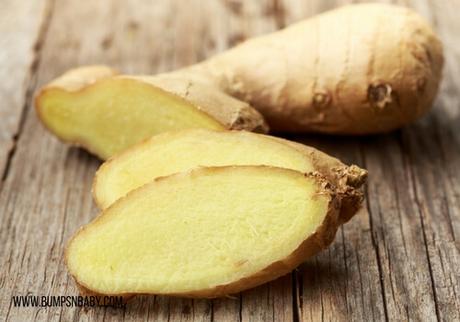
Another super remedy for hair fall- Ginger. It is rich in vitamins, minerals and some circulatory agents that promote good blood circulation to the scalp.
Read: #9. Oil Massage Ginger for cold and cough in kids- Take few fresh ginger and peel off the skin
- Chop it into pieces
- Add sufficient amount of milk and grind it to a paste
- Apply this on to the scalp
- After 10 minutes, wash it off with water
Massaging your scalp regularly with warm oil helps in good blood circulation to scalp thus promoting healthy hair.
If possible daily massage your hair with any of the below mentioned oil for 5 minutes a day. After 1 hour, wash your hair with a mild shampoo. You can also massage your hair at night before going to bed and next day morning wash your hair with a mild shampoo.
Coconut oil which is rich in essential fatty acids helps to moisturize, condition and stimulate hair growth.
You can apply warm coconut oil on your scalp. You can also use curry leaf, small onion, garlic or fenugreek seeds while heating the coconut oil to add its nutrient value.
Another old age method is to burn the coconut shell and mix the ashes of the shell in coconut oil. Wash your hair after few hours with a mild shampoo
Castor oil which is rich in omega-3 fatty acids and ricinoleic acid is very beneficial for treating excessive postpartum hair loss.
Mix equal quantity of castor oil and coconut oil. Warm this mixture and massage on your scalp regularly. Wash it off with mild shampoo after few hours
Almond oil, rich in vitamin E is very beneficial for the hair growth.Warm some almond oil. Massage into hair and scalp and wash it off with a mild shampoo after few hours.
What can I do to stop my hair fall other than the home remedies?
We lose a good amount of nutrients from our body while nursing or breast feeding. So, it's very important to provide or replace the lost nutrients. Don't focus on losing weight soon after delivery. Your body needs the most nutrients at this period. Take care of your body and don't make your body starve for nutrients.

Include these foods in your daily diet which can make you and your hair healthy.
2)Green leafy vegetables and fruitsIf you want a healthy body and healthy hair then incorporate foods containing essential fatty acids. Omega 3 fatty acid is one of the main essential fatty acid which help to nourish the hair and to prevent postpartum hair loss.
3) Vitamin supplementsFish oils, flax seeds, chia seeds, walnuts, soybean, are good sources of these essential fatty acids.
Green leafy vegetables and fruits are the natural sources of fibre, vitamins and minerals way to prevent hair loss.
If you are not getting the right amount of vitamins from food, consult a medical practitioner and get some vitamin supplements prescribed.
Read: Postnatal Diet Followed in North India
Avoid harsh chemical based shampoos for your hair. Use mild shampoos or herbal based shampoos for your hair.
- Go for wooden comb to reduce hair fall
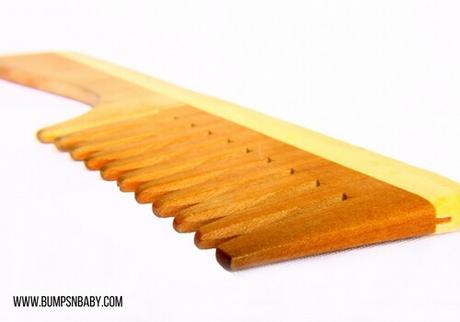
Use wooden comb which are wide toothed to reduce hair fall post pregnancy. This will avoid that unnecessary pulling of hair. Most importantly, never comb wet hair.
Avoid using hair tools like blow dryer, straightening or curling hot rollers to control hair fall. All this make your hair so dry and weak.
Long hair maintenance is very difficult at the initial months of pregnancy. So, it's better to have short hair. In fact, your hair will go back in length.
If you don't want a short haircut, then trim your hair frequently to avoid split ends.
Headbands, bows and scarves are easier and stylish way to manage your hair while going out with your baby. This can save time in your busy motherhood phase.
It is a must that you don't stress yourself much. Anyway things are not going to change if you stress. So why unnecessarily damaging your health and body. When you stress out, hair fall will happen tremendously.
Also read: 11 Tips for Hair Care Post Baby
When should I be worried about hair fall after delivery?
If your heavy hair loss continuous or is more than normal even after one year of delivery, you may consider checking with a doctor and check your vitamins and mineral levels.
A cautionary advice to moms - Bonus TipNormal hair fall postpartum does not cause large bald spots, it will only cause thinning of hair volume. If it is causing bald spots get it checked with a doctor.
Also if you had thyroid while pregnant or developed one after pregnancy, you may have high hair fall. Rule out any chances of postpartum thyroid disorder if you find hair fall too much along with other symptoms of postpartum thyroiditis.
"Hair tourniquet ", this word may be new to you. Even for me, it's a new term. I just came across this word recently.
This a term used when strands of your hair wrap up tightly around your tiny tot's fingers, toes, wrists, ankles, or penis. This would be very painful for their soft skin.
So always be careful whenever you are with baby, make sure you tie up your hair neatly.
Postpartum hair loss is completely hormonal. There is no need to stress about it. Take care of your hair post-delivery with those amazing traditional home remedies mentioned here and by following a healthy diet to keep those manes beautiful.
If you have any other wonderful hair care tips on how to control hair fall after delivery passed on to you from your mom or grandma, do share it in the comment box below. It would be really helpful for all the first-time moms out here.
